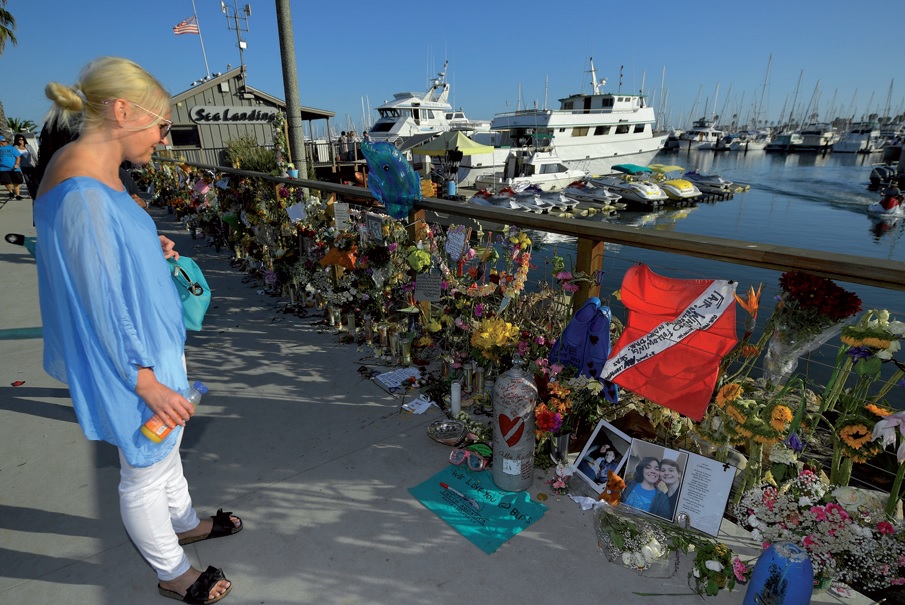Petition in deadly boat fire cites 1851 law


A maritime expert said it's unlikely a judge would grant a petition by the owners of a dive boat to limit their financial liability for a Labor Day fire on board that resulted in the loss of 34 lives.
"The limitation of liability act certainly has the potential of limiting the liability to zero in this case, because there's no value to the vessel after the fire, so it has that potential, but from a practical standpoint, I don't expect it will be successful," Charles D. Naylor, a maritime personal injury trial lawyer in California, told China Daily.
The 75-foot commercial dive boat Conception caught fire and sank near Santa Cruz Island early in the morning of Sept 2. It had on board 39 people — six crew members and 33 passengers. Only five crew members survived the tragedy.
In a petition filed last Thursday, Truth Aquatics Inc., a Santa Barbara, California-based company that owns the Conception, requested exoneration from or limitation of liability, citing the Limitation of Liability Act of 1851.
The act allows ship owners to minimize damage claims as long as they have no privity or knowledge to the cause of the incident, for example, personal fault on the part of the shipowner or charterer (the family trust or Truth Aquatics) themselves.
The law was enacted by Congress in 1851 to spur investment in the maritime industry. At the time, communication was limited between the owners and the master once the ship departed from the harbor.
But in today's society, instantaneous communications means it will be hard for owners to prove they have "no privity or knowledge to the cause of the incident".
Naylor expects there will be evidence to show that the Conception wasn't safely equipped, which prevented the passengers from escapingthe fire. He said that could be a problem for the owners.
"It seems as if though this fire started probably in the galley. At least, that seems the most likely circumstance. Galley fires are not uncommon; it should not have been possible that a fire would get so far out of hand, so fast, that the fire couldn't be put out, and that it would block all exits from the passenger's compartment," he said.
"If they were maintaining a watch as they were required to do, an effective watch should have discovered that fire before it was out of hand. Just doesn't seem realistic that it could've gotten to that point, blocking all the exits to the passengers by the time it was discovered," Naylor added.
Michael Karcher, a practicing maritime lawyer at Karcher, Canning & Karcher in Florida, who also teaches admiralty law at the University of Miami School of Law, said the determination of whether the owners will be granted the limitation of liability requires a two-step analysis.
"First, the court must determine what acts of negligence or conditions of unseaworthiness caused the accident. Second, the court must determine whether the owner of the vessel had knowledge or privity of those same acts of negligence or conditions of unseaworthiness," he said.
"Once the opposing party has proved negligence or unseaworthiness, the burden of proof shifts to the owner of the vessel to prove lack of privity or knowledge," he added.
Martin Davies, a martime law professor from Tulane University, told China Daily that "on average, petitions for limitation succeed about 50 percent of the time in the US, but averages are of little help – everything depends on the facts of the case, and it's too early to say in the present case".
However, filing the petition early helps the owners, or the insurers, to choose the court in which the litigation will take place. If the owner waited until it was sued by one of the families, it could only institute limitation proceedings in the jurisdiction where it was sued, Davies said.
If the judge allows the owners to limit their liability, then families of the victims will have to bring their claims against the fund established by the shipowner in the limitation proceedings, he said.
Truth Aquatics Inc said in a message posted on its Facebook page Sept 6 that the lawsuit is "another unfortunate side of these tragedies".
"This wouldn't be something that we as a family would even consider, yet when something like this happens, insurance companies and numerous stakeholders convene and activate a legal checklist," it said.
"The timing is on them. Our hearts and minds are on the tragedy and finding answers,"added the company, which describes itself as "a small family-run business" that never had "an incident" in 45 years.

































